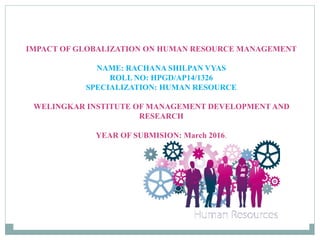Globalization refers to the increasing interconnectedness and interdependence of the world's economies, cultures, and populations, driven by advances in communication, transportation, and technology. It has had a significant impact on human resource development (HRD) in several ways.
First, globalization has led to the expansion of multinational corporations and the creation of a global job market. This has increased the mobility of workers and made it easier for individuals to seek employment opportunities abroad. It has also increased the competition for skilled labor and led to the need for continuous learning and development to stay competitive in the global job market. HRD programs and initiatives, such as training, education, and professional development, have become increasingly important for workers to acquire the skills and knowledge necessary to succeed in this global environment.
Second, globalization has led to an increase in cultural diversity in the workplace. As companies expand into new markets and countries, they often hire a diverse workforce with different cultural backgrounds and experiences. This can create challenges for HRD professionals, who must find ways to effectively manage and develop a diverse workforce. HRD initiatives such as cultural sensitivity training and diversity and inclusion programs can help to ensure that all employees feel valued and supported in the workplace.
Third, globalization has had an impact on the nature of work itself. The advancement of technology and the increasing use of outsourcing and offshoring have led to changes in the structure and organization of work. For example, the rise of telecommuting and remote work has made it possible for individuals to work from anywhere in the world. HRD professionals must be prepared to adapt to these changes and help workers develop the skills and knowledge necessary to thrive in a global, technology-driven economy.
In conclusion, globalization has had a significant impact on human resource development. It has expanded the global job market, increased cultural diversity in the workplace, and changed the nature of work itself. HRD professionals must be prepared to meet the challenges and opportunities presented by globalization in order to effectively develop and manage the workforce in this rapidly changing global environment.






